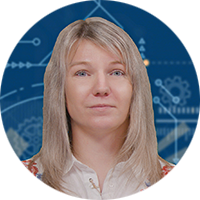
Khalyasmaa Alexandra Ilmarovna
Associate professor of the Electrical Engineering Department of the Ural Power Engineering

Associate professor of the Electrical Engineering Department of the Ural Power Engineering

Associate professor of the Electrical Engineering Department of the Ural Power Engineering

Leading Researcher of the Electrical Engineering Department of the Ural Power Engineering Institute, Ural Federal University, PhD in technical sciences
The purpose of the course is to form a holistic view on the construction of intelligent systems and application of machine learning methods in the field of solving applied problems of electrical power engineering. The course involves theoretical and experimental research in machine learning and design of applied intelligent systems, as well as acquisition of skills in data representation, processing and analysis in Python.
The course contains a description of best practices for integrating machine learning into a modern fuel and energy complex. One of the important components of the course are practical assignments - industry cases, providing the necessary knowledge and skills in data analysis and machine learning to solve real-world applications. The course covers a wide target audience. Fuel and energy specialists will be able to get the necessary digital competences, and information technology specialists will get a detailed understanding of the field of application of machine learning for solving problems of the fuel and energy complex.
Course duration: 12 weeks
Workload per week: 5–7 hours
Number of ECTS: 3 credits
Bachelor degree
The purpose of the course is to give students a holistic view of the structure and principles of operation of the cybersecurity tools at the fuel and energy sector facilities in the context of the digital transformation of the industry.
The course presents the principles of building and using digital substations, information and analytical systems, the vulnerabilities and threats in the field of information security in the power industry, the principles of building models and databases, database management systems and providing access to them.
The course also discusses the principles of using risk management, legislative, organizational and technical means of ensuring cybersecurity (cryptography, software and hardware) and the features of using machine learning in the power industry from the point of view of cybersecurity.
Upon completion of the course, you will be able to:
1. Introduction to machine learning. Digital transformation of the power industry
1.1. Digitization of the power industry
1.2. Intelligent systems
1.3. Machine learning
1.4. Mathematical foundations
1.5. Probability theory for Machine learning
1.6. Data preprocessing and visualization
2. Types of machine learning. Data sampling and definition of metrics
2.1. Model evaluation metrics
2.2. Fuzzy logic
3. Supervised learning. Application in the power industry
3.1. Basic algorithms in classification and regression problems
3.2. Classification algorithms. Practical application in power industry
3.3. Ensemble models and methods
3.4. Regression. Practical application in power industry
3.5. Regression trees. Practical application in power industry
4. Unsupervised learning. Application in the power industry
4.1. Unsupervised learning. Clustering (Part I)
4.1. Unsupervised learning. Clustering (Part II)
4.3. K-means method. Practical application in power industry
5. Neural networks. Application in the power industry
5.1. Artificial neural networks
5.2. Artificial neural networks. Practical application in power industry
6. Genetic algorithms. Application in the power industry
6.1. Genetic algorithms
6.2. Swarm intelligence algorithms
6.3. Population-based optimization. Practical application in power industry